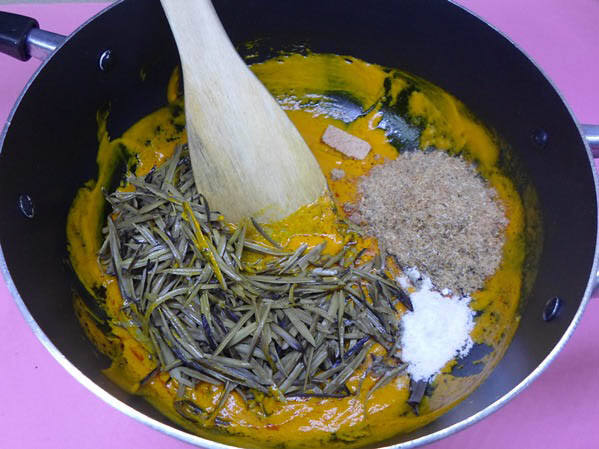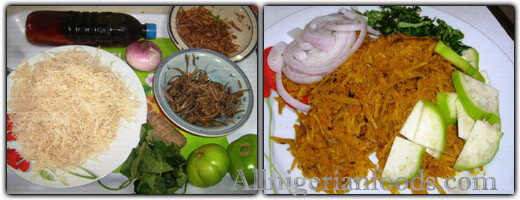What U Ate
African salad is a delicious Nigerian meal that is native to the ndi Igbo (people of Igbo), here is all you need to know about this Nigerian Delicious Dessert and even all the ingredients used in preparing it.
African salad is a delicious Nigerian meal that is native to the ndi Igbo (people of Igbo), here is all you need to know about this Nigerian Delicious Dessert and even all the ingredients used in preparing it.
This meal is very popular in the eastern part of Nigeria; it is one of the most Popular Igbo Recipe, I don’t visit this part of the country and come back without having a taste of this Nigerian delicacy.
Abacha – as the Igbos love to call it – is one of the most popular evening desserts in the eastern villages, it serves best as kola to visitors, as a matter of fact, there are villages in the eastern part of Nigeria that only offer ugba or abacha to visitors and even visitors have come to love and desire the delicious delicacy.
The fresh Abacha (African salad is a by-product of cassava), there are a lot of processes involved with obtaining the fresh abacha that is used in preparing the African salad that we all know .
Most rural dwellers are very familiar with the whole process involved.
The first thing to do (if you live in the village or own a farm) is to obtain cassava tubers, wash thoroughly and boil along with water for twenty to thirty minutes then pill to remove the brown outer layer, and cut to tiny bits.
The sliced cassava is then soaked in water for 18 hours or more. The last thing to do would be to wash thoroughly with clean water then sun-dry and store in an airtight seal. Dried cassava chips can last more than a year if stored in an air tight dry environment.
But if you live in developed cities you probably wouldn’t need to go through this cumbersome and tiresome procedure, just buy every one of the ingredients in the market
Here are all the ingredients that are needed for preparing Abacha (African salad) whether you are within or outside Nigeria. Some of them are extremely required while few of them are optional
Ingredients for African Salads
6 to 8 cups of Abacha (African Salad) {image below}
Ehu 3 seeds (optional)
1 to 2 cups Of Ugba (Ukpaka)
half cup of crayfish
1 to 2 cubes of maggi or knorrAbout 10cl of palm oilEdible powdered potash(1 teaspoon)
salt and pepper to taste.
3 to 5 garden eggs (optional)
Utazi leaves (optional)
Garden egg leaves (optional) (image in the tray below)
Meat/dry fish or stock fish.(optional)
Ehu 3 seeds (optional)
1 to 2 cups Of Ugba (Ukpaka)
half cup of crayfish
1 to 2 cubes of maggi or knorrAbout 10cl of palm oilEdible powdered potash(1 teaspoon)
salt and pepper to taste.
3 to 5 garden eggs (optional)
Utazi leaves (optional)
Garden egg leaves (optional) (image in the tray below)
Meat/dry fish or stock fish.(optional)
I told you that most Nigerian foods are served with either fish or meat, Even the African Salad (Abacha) is also served with either fish, meat or even stock fish (okporoko), although there is none of that in the image below.
Here is how to prepare African salad.
I like using the dried abacha (as you would find in the plate above) instead of the freshly made wet abacha the only reason is because the former give you the advantage of heating at the beginning for few minutes without being overly wet.
You can either heat or soak the dry Abacha in boiled water for about three minutes, then sieve and keep on a separate bowl.
Blend your crayfish and also slice the onions, garden egg leaves. It is advisable to dissolve the powdered potash in about 5 cl of clean water; this is a trick I employ just to easily filter out unwanted solid materials that is often embedded in potash.
Filter the dissolved potash into a mortar or pot leaving out the residue.
Add about 100ml of palm oil and stir to form a yellowish paste (ncha, as addressed by the igbos), This is the first part to making Abacha (African Salad), add the ground crayfish and pepper, stir, then add the ground ehu if you like.
Ugba is an important ingredient in the process of making African salad, it is considered incomplete without the present of this ingredient. Ugba is usually sold in most Nigerian markets or African shops (if you live outside Nigeria).
 |
| Ugba |
Add the ugba to the mixture and stir, and then add the abacha, salt. It is advisable to heat the abacha (using the method outlined above) just few second before you use so it doesn’t get cold, as most people in Nigeria like their Abacha to be a little bit warm.
Stir the whole combination and you are almost through with the preparation part.
The garden eggs, the leaves and the onions are used mostly to spice up or for decoration purposes and not added during preparation but while dishing out. They are often sliced and kept aside in different plates or bowls, then added while individual plates are dished out; this also goes for the meat or fish used.
Taste the combination in the mortar or pot, if it is as tasty as you desire, you may also want to turn on the cooker and heat for few minutes if it is not as warm as you desire.
Serve with the meat and also add the garden eggs (sliced) and leaves to individual plate, most people in the rural centers like to take African salad with palm wine. May be a keg of palm wine can give a smooth. Culled from allnigerianfoods.com
Read more @WhatUAte.blogspot.com

No comments:
Post a Comment